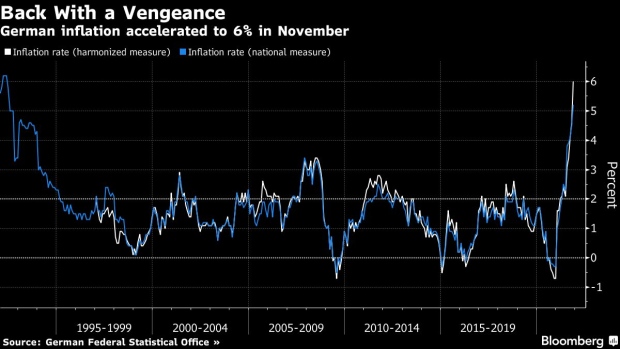Nov 29, 2021
German Inflation Surges to 6% as ECB Insists Spike Will Pass
, Bloomberg News

(Bloomberg) --
German inflation surged more than expected in November, complicating the European Central Bank’s mission to convince consumers that the current spike will soon ease.
Prices increased an annual 6% under a European-Union harmonized measure. A national gauge rose to 5.2%, the highest since 1992.
German bonds extend declines slightly, pushing the 10-year yield four basis points higher to minus 0.30%.
Earlier on Monday, Spain reported a rate of 5.6% that was bolstered by more expensive food. Prices in Belgium jumped 5.6%. Data for the euro area due Tuesday are set to show a 4.5% gain.
Inflation rates far exceeding the ECB’s 2% goal across vast parts of the region have prompted officials including President Christine Lagarde to reassure citizens that price pressures won’t run out of control. A large portion, they argue, is due to temporary factors that will fade with time.
Executive Board member Isabel Schnabel attempted to assuage concerns in Germany this morning, explaining in a TV interview that “November will prove to be the peak.”
The Bundesbank warned last week that inflation could climb to just under 6% this month, and attributed about 1 1/2 percentage points to a temporary cut in value-added tax and very low prices for travel-related services in 2020.
While the central bank predicts price pressures will retreat in coming months, it said inflation could remain well above 3% for a longer period of time.
Price Spiral
Employees of Germany’s federal states won a 2.8% raise and a tax-free one-time payment of 1,300 euros ($1,467.1) on Monday, in a deal that will ultimately cover nearly 3.5 million people. Meanwhile, Olaf Scholz’s new government is planning to lift the country’s minimum wage to 12 euros toward the end of next year.
Both could have consequences that might be difficult to ignore. One reason officials have been able to classify the current inflation spike as “temporary” is that secondary effects have failed to materialize so far.
Schnabel, a contender to succeed Jens Weidmann at the helm of the Bundesbank when he leaves at the end of the year, told Bloomberg last week that inflation risks are “skewed to the upside.” It’s a signal she might push for a faster than currently anticipated reduction in monetary stimulus when the ECB gathers in December.
Both the Council of Economic Advisers and Germany’s national tabloid Bild have issued warnings on ultra-loose monetary policy.
The ECB is set to determine next month whether its pandemic bond-buying program will end in March as planned, and how an older asset-purchase plan might need to be adjusted to address lingering uncertainty. The emergence of the new Omicron coronavirus strain risks new containment measures after the Netherlands and Germany already imposed new curbs and Austria and Slovakia went into lockdown.
(Updates with market reaction in third paragraph.)
©2021 Bloomberg L.P.